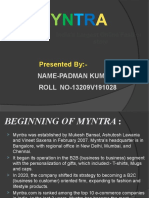05 Handout 1
05 Handout 1
Uploaded by
shewhocantCopyright:
Available Formats
05 Handout 1
05 Handout 1
Uploaded by
shewhocantOriginal Title
Copyright
Available Formats
Share this document
Did you find this document useful?
Is this content inappropriate?
Copyright:
Available Formats
05 Handout 1
05 Handout 1
Uploaded by
shewhocantCopyright:
Available Formats
TH2013
MARKETING 101
Introduction to Marketing
Definition of Marketing
Marketing refers to activities a company undertakes to promote the buying or selling of a product or service.
Marketing includes advertising, selling, and delivering products to consumers or other businesses. Marketing
as a discipline involves all the actions a company undertakes to draw in customers and maintain relationships
with them (Twin, 2020)
Importance of Marketing (Varsha, n.d.)
For the Business
• Marketing helps businesses to keep pace with the changing tastes, fashions, and preferences of the
customers. It works out primarily because ascertaining consumer needs and wants is a regular
phenomenon and improvement in existing products and the introduction of new products is a continuous
process. Marketing thus contributes to providing better products and services to the consumers and
thereby improving their standard of living.
• Marketing plays an important role in the development of the economy. Various functions and sub-
functions of marketing like advertising, personal selling, packaging, and transportation, among others,
generate employment for many people and accelerate the growth of a business.
• Marketing helps the business in increasing its sales volume, generating revenue, and ensuring its success
in the long run.
• Marketing also helps the business in meeting competition most effectively.
• Marketing builds up the company’s reputation. To conquer the general market, marketers aim to create
a brand that helps in name recognition and product recall.
For the Consumers
• Marketing promotes product awareness to the public. Marketing creates a win-win situation for both
customers and the company. With the help of marketing, product/service awareness is generated among
people, thus making them capable of identifying their needs and satisfying them.
• By the process of new product development, marketing managers identify the needs of customers,
thereby finding ways to cater to them.
• With the help of the marketing of different products, a customer can compare the competitors’ products
and buy the best one among the available choices.
• By way of promotion activities conducted by marketers, customers get extra benefit for buying the
products.
• With the development of various new marketing concepts like Customer Relationship Marketing (CRM),
customers get benefits since companies have now realized the importance of existing customers and thus
try to maintain them.
05 Handout 1 *Property of STI
student.feedback@sti.edu Page 1 of 4
TH2013
Extended Marketing Mix (Professional Academy, n.d.)
Product - The product should fit the task consumers want, it should work, and it should be what the consumers
are expecting to get. (The good or service that the customer buys).
Place – The product should be available from where the target consumer finds it easiest to shop. This may be
High Street, Mail Order, or the more current option via e-commerce or an online shop. (How the product is
distributed to the customer).
Price – The product should always be seen as representing good value for money. This does not necessarily
mean it should be the cheapest available. One of the main tenets of the marketing concept is that customers
are usually happy to pay a little more for something that works really well for them. (How much the customer
pays for the product).
Promotion – Advertising, public relations, sales promotion, personal selling, and, in more recent times, social
media are all key communication tools for an organization. These tools should be used to put across the
organization’s message to the correct audiences in the manner they would most like to hear, whether it be
informative or appealing to their emotions. (How the customer is found and persuaded to buy).
People – All companies are reliant on the people who run them from front line sales staff to the Managing
Director or whoever is at the top of the business. Having the right people is essential because they are as much
a part of the business offering as the products/services. (The ones who make contact with customers in
delivering the product).
Processes –The delivery of the service is usually done with the customer present so how the service is delivered
is once again part of what the consumer is paying for. (The systems and processes that deliver a product to a
customer).
Physical Evidence – Almost all services include some physical elements even if the bulk of what the consumer
is paying for is intangible. For example, a hair salon would provide their client with a completed hairdo and an
insurance company would give their customers some form of printed material. Even if the material is not
physically printed (in the case of PDFs), they are still receiving a “physical product” by this definition. (The
elements of the physical environment the customer experiences).
Marketing Strategies and Promotions (Chi, 2020)
Traditional Marketing
Traditional marketing refers to brand promotion on any kind of channel that has been around since before the
advent of the internet. Because information wasn’t as easily accessible and readily available, the majority of
traditional marketing relied on outbound tactics such as print, television ads, and billboards.
Search Engine Marketing
Search engine marketing, or SEM, includes all activities in the effort of ensuring the business's products or
services are visible on search engine results pages (SERPs). When a user types in a certain keyword, SEM
enables the business to appear as a top result for that search query.
Content Marketing
Content marketing is a key instrument in inbound and digital marketing because the content is what allows
audiences as well as search engines, such as Google, to find the information they need on the web. By
05 Handout 1 *Property of STI
student.feedback@sti.edu Page 2 of 4
TH2013
definition, it involves creating, publishing, and distributing content to their target audience. The most common
components of a content marketing program are social media networks, blogs, visual content, and premium
content assets like tools, ebooks, or webinars.
Social Media Marketing
Social media marketing is creating content to promote brand and products on various social media platforms
like Facebook, Instagram, LinkedIn, and Twitter. Businesses should remember their audience as they create
content. No one logs on to social media looking for something to purchase, so think through what types of
content that is useful, informative, entertaining, and/or compelling.
Video Marketing
Video marketing is a type of content marketing that involves using video as a medium. The idea is to create
videos and upload them to a website, YouTube, and social media to boost brand awareness, generate
conversions, and close deals. Some video marketing apps even allow businesses to analyze, nurture, and score
leads based on their activity.
Voice Marketing
Voice marketing is leveraging smart speakers like Amazon Alexa and Google Home to educate people and
answer questions about their topics of interest. Optimizing a website for voice search is very similar to
optimizing for organic search, but beyond that, businesses can also get inventive by creating a Google action
or Alexa skill.
Email Marketing
Email marketing involves sending educational or entertaining content and promotional messages to people
who willingly subscribed to a business’ newsletter. The primary goal is to deepen their relationship with the
customer or prospect by sending marketing messages personalized to them. Pushing that idea further, they
can also use email marketing to nurture leads with content that moves them along the buyer’s journey.
Conversational Marketing
Conversational marketing is the ability to have 1:1 personal conversations across multiple channels, meeting
customers how, when, and where they want. It is more than just live chat, extending to phone calls, text
messages, Facebook Messenger, email, and more.
Buzz Marketing
Buzz marketing is a viral marketing strategy that leverages refreshingly creative content, interactive events,
and community influencers to generate word-of-mouth marketing and anticipation for the product or service
the brand is about to launch.
Influencer Marketing
Influencer marketing is designed to tap into an existing community of engaged followers on social media.
Influencers are considered experts in their niches. These individuals have a large influence over an audience a
business might be trying to reach and can be helpful marketing to those buyers.
05 Handout 1 *Property of STI
student.feedback@sti.edu Page 3 of 4
TH2013
Acquisition Marketing
While all types of marketing are geared toward acquiring customers, the majority of types have broader and
softer goals such as improving brand awareness or driving traffic. In contrast, acquisition marketing is laser-
focused on acquiring customers.
Contextual Marketing
Contextual marketing is targeting online users with different ads on websites and social media networks based
on their online browsing behavior. The number one way to make contextual marketing efforts powerful is
through personalization. A CRM combined with powerful marketing tools such as a smart call to actions (CTAs)
can make a website seem more like a “choose your own adventure” story, allowing the user to find the right
information and take the right actions more effectively.
Brand Marketing
Brand marketing is shaping the brand’s public perception and forging an emotional connection with their
target audience through storytelling, creativity, humor, and inspiration.
Native Marketing
Native marketing is when brands pay reputable publishers to collaborate in the creative process of crafting a
sponsored article or video that covers one of the publisher’s main topics and looks like a regular piece of
content on their website. They also pay these publishers to distribute this sponsored content to their massive
audience through social media and their website. In sum, when brands pay for a publisher’s native advertising
services, they can leverage their editorial expertise and reach to help their brand tell captivating stories to a
bigger and better viewership.
References:
Chi, C. (2020). The Ultimate list of type of marketing. Retrieved on May 21, 2020. In HubSpot.
https://blog.hubspot.com/marketing/marketing-types
Twin, A. (2020). Marketing. Retrieved on May 21, 2020. In Investopedia.
https://www.investopedia.com/terms/m/marketing.asp
Professional Academy. (n.d.). Marketing Theories – The Marketing Mix – From 4 PS to 7 PS.
https://www.professionalacademy.com/blogs-and-advice/marketing-theories---the-marketing-mix---
from-4-p-s-to-7-p-s
Varsha, C. (n.d.). Importance of Marketing.
https://www.businessmanagementideas.com/marketing/importance-of-marketing/importance-of-
marketing/19442
05 Handout 1 *Property of STI
student.feedback@sti.edu Page 4 of 4
You might also like
- LAWS1014 Reading Guide S1 2024Document64 pagesLAWS1014 Reading Guide S1 2024rachelNo ratings yet
- Promotional Strategies of DoveDocument56 pagesPromotional Strategies of DovePratyush Raj Benya64% (11)
- Project On Network MarketingDocument50 pagesProject On Network Marketingharsha67% (12)
- Executive Order 11490 PDFDocument2 pagesExecutive Order 11490 PDFKeith0% (1)
- Marketing MGMTDocument10 pagesMarketing MGMTSI M.No ratings yet
- Marketing StudyDocument4 pagesMarketing Study2888shashankNo ratings yet
- Market Assessment With or Applications - Compress 15 73Document59 pagesMarket Assessment With or Applications - Compress 15 73Prince GoyalNo ratings yet
- Shriram LifeDocument11 pagesShriram LifeArchana J RetinueNo ratings yet
- Principles of AdvertisingDocument7 pagesPrinciples of AdvertisingOmolola MohammedNo ratings yet
- Chapter 1 Intro. To MarketingDocument17 pagesChapter 1 Intro. To MarketingNeeraj JoshiNo ratings yet
- PRINCIPLES OF MARKETING PPDocument77 pagesPRINCIPLES OF MARKETING PPAvegail Ocampo TorresNo ratings yet
- An Introduction To Integrated Marketing CommunicationDocument57 pagesAn Introduction To Integrated Marketing CommunicationPooja SheoranNo ratings yet
- MGT 263 Assignment 1Document8 pagesMGT 263 Assignment 1Aysha Muhammad ShahzadNo ratings yet
- Chapter 1 Direct MarketingDocument75 pagesChapter 1 Direct MarketingalinaNo ratings yet
- Defining MarketingDocument5 pagesDefining MarketingMinh ThưNo ratings yet
- IMC NotesDocument11 pagesIMC NotesAvinash GurjarNo ratings yet
- Understanding MarketingDocument10 pagesUnderstanding MarketingvsnpradeepNo ratings yet
- MarketingDocument6 pagesMarketingGiang TuyếtNo ratings yet
- Principles of MarketingDocument5 pagesPrinciples of MarketingMicah Dea PelayoNo ratings yet
- MM, Group No. 10 (Marketing Commu. Mix) in DetailDocument36 pagesMM, Group No. 10 (Marketing Commu. Mix) in DetailJaimin VaghelaNo ratings yet
- H.chapter 1Document20 pagesH.chapter 1ENVIRINMENTAL HISTORY 001No ratings yet
- Chapter 1 MarketingDocument18 pagesChapter 1 MarketingLayza Mea ArdienteNo ratings yet
- Unit1 PDFDocument91 pagesUnit1 PDFasadNo ratings yet
- Marketing vs. AdvertisingDocument1 pageMarketing vs. AdvertisingKindra Hermaelle KombssNo ratings yet
- Customer Satisfaction: Executive SummaryDocument31 pagesCustomer Satisfaction: Executive SummaryChandrashekar AkkiyavarNo ratings yet
- MariameDocument4 pagesMariameelpreciso.10No ratings yet
- STUDY MATERIAL FOR MarketingDocument41 pagesSTUDY MATERIAL FOR Marketingrajanikanthmeka4No ratings yet
- Marketing SeoDocument5 pagesMarketing SeoShuvo IslamNo ratings yet
- Week 7 - 11 Business Implementation & Marketing Plan, Product Pricing Trategies, Promotion.Document42 pagesWeek 7 - 11 Business Implementation & Marketing Plan, Product Pricing Trategies, Promotion.castillojosephrayNo ratings yet
- Unit 1 MKTDocument17 pagesUnit 1 MKTsahilsingh20022000No ratings yet
- First Year Mcom: Submitted To: Prof Harshini EstherDocument17 pagesFirst Year Mcom: Submitted To: Prof Harshini EstherSonu SinghNo ratings yet
- TM1Document64 pagesTM1Suzen KshNo ratings yet
- Unit 1 MHSDocument7 pagesUnit 1 MHSSaksham SharmaNo ratings yet
- MM Assignment-2 PratyushDocument17 pagesMM Assignment-2 PratyushPratyush khuntiaNo ratings yet
- Integrated Marketing CommunicationsDocument25 pagesIntegrated Marketing CommunicationsThe Pongase SibsNo ratings yet
- Types of MarketingDocument7 pagesTypes of MarketingAnurag Bajaj100% (1)
- Marketing Handout 01Document4 pagesMarketing Handout 01gcuusmanNo ratings yet
- Obective of Promotion MixDocument5 pagesObective of Promotion MixAbhisek DasNo ratings yet
- Integrated Marketing CommunicationDocument41 pagesIntegrated Marketing Communicationvrekhavasu100% (12)
- 8 Marketing ManagementDocument146 pages8 Marketing ManagementAadarshini Gupta100% (1)
- Viva Voice QuestionsDocument16 pagesViva Voice QuestionsJibran HabibNo ratings yet
- Unit-7 Marketing CommunicationDocument41 pagesUnit-7 Marketing CommunicationDev ParmarNo ratings yet
- What Is Marketing?: Alexandra TwinDocument6 pagesWhat Is Marketing?: Alexandra TwinLE JOHN AQUINO100% (1)
- Consumer BehaviourDocument68 pagesConsumer Behaviourprinik075No ratings yet
- Integrated Marketing Communications: Submitted by Group 8Document37 pagesIntegrated Marketing Communications: Submitted by Group 8Lavanya AgarwalNo ratings yet
- MM Unit VDocument33 pagesMM Unit Vmrrex1430No ratings yet
- Bus - Marketing ModulesDocument25 pagesBus - Marketing ModulesMaeanne CelesteNo ratings yet
- Promotions and Advertisements Take A Business Onto The Next LevelDocument4 pagesPromotions and Advertisements Take A Business Onto The Next LevelLipika haldar100% (1)
- Module 6A - Promotional Mix (LAPTOP-BF7D881M's Conflicted Copy 2022-10-02)Document11 pagesModule 6A - Promotional Mix (LAPTOP-BF7D881M's Conflicted Copy 2022-10-02)Jhan Hans DrilonNo ratings yet
- Marketing CommunicationDocument19 pagesMarketing CommunicationHarsh GargNo ratings yet
- Impact of Online MarketingDocument38 pagesImpact of Online MarketingSabaNo ratings yet
- Chapter-1: Introduction Need of The Study Scope of The Study Objectives Methodology LimitationsDocument13 pagesChapter-1: Introduction Need of The Study Scope of The Study Objectives Methodology LimitationsKalyan RagampudiNo ratings yet
- Marketing ManagementDocument10 pagesMarketing Managementsam.berlin.32No ratings yet
- Unit Iii Synopsis 4Document18 pagesUnit Iii Synopsis 4Samman GuptaNo ratings yet
- A Brief Introductionto Integrated Marketing CommunicationDocument39 pagesA Brief Introductionto Integrated Marketing CommunicationAbhimanyu VermaNo ratings yet
- What Is MarketingDocument4 pagesWhat Is MarketingmanulaNo ratings yet
- CC 11 Principles of MarketingDocument41 pagesCC 11 Principles of Marketingpkamal0111No ratings yet
- IIM Kashipur Management Kit 2021-23Document65 pagesIIM Kashipur Management Kit 2021-23kapilsharma10No ratings yet
- Group 4 PromotionDocument11 pagesGroup 4 PromotionRegine AlfanteNo ratings yet
- Unit 2 MK 03Document9 pagesUnit 2 MK 03Mohammad ShahvanNo ratings yet
- The 4 Ps of Marketing Are ProductDocument5 pagesThe 4 Ps of Marketing Are Productalen paulNo ratings yet
- College of Law Government and International Studies (Assg 1)Document5 pagesCollege of Law Government and International Studies (Assg 1)Ash HykalNo ratings yet
- MinutesDocument24 pagesMinutesayen cusiNo ratings yet
- Presented By:-: Name-Padman Kumar Sahoo Roll NO-13209V191028Document12 pagesPresented By:-: Name-Padman Kumar Sahoo Roll NO-13209V191028padmanNo ratings yet
- Bold Statement of IssuesDocument4 pagesBold Statement of IssueshefflingerNo ratings yet
- Question:-Provide A Detailed Summary of The Civil Rights Act of 1866Document2 pagesQuestion:-Provide A Detailed Summary of The Civil Rights Act of 1866Rajshekhar BoseNo ratings yet
- Exercise 1.Document2 pagesExercise 1.Satyajeet PawarNo ratings yet
- Jail Officers - AssessmentDocument4 pagesJail Officers - AssessmentDonnie Ray Olivarez SolonNo ratings yet
- Aaa V. BBB G.R. No. 212448, January 11, 2018 FactsDocument5 pagesAaa V. BBB G.R. No. 212448, January 11, 2018 FactsMarie Angelica NacionalesNo ratings yet
- Admin NotesDocument179 pagesAdmin NotesJa Met PhilNo ratings yet
- Article by Desmond Tutu The Doctrine of Revenge I Have Seen The Horror of The Death Penalty and The Violence It Propels. It Is Time For A Global BanDocument1 pageArticle by Desmond Tutu The Doctrine of Revenge I Have Seen The Horror of The Death Penalty and The Violence It Propels. It Is Time For A Global Bandennis ohNo ratings yet
- Handout Exercise Advanced Vocab Exercise Words in News HeadlinesDocument3 pagesHandout Exercise Advanced Vocab Exercise Words in News HeadlinesgabyferrNo ratings yet
- NSTP TopicsDocument18 pagesNSTP TopicsJereline De Pablo100% (2)
- E020 Ankit Marketing Iv RPDocument14 pagesE020 Ankit Marketing Iv RPAnkit SathyaNo ratings yet
- Washington County Criminal ComplaintDocument7 pagesWashington County Criminal ComplaintPatch MinnesotaNo ratings yet
- Intestate Estate of Manolita Gonzales V PeopleDocument1 pageIntestate Estate of Manolita Gonzales V PeopleGio RuizNo ratings yet
- Daja E. Henry: Multimedia Educator + Traveling StorytellerDocument1 pageDaja E. Henry: Multimedia Educator + Traveling StorytellerDaja HenryNo ratings yet
- Principles of Management: Corporate Social ResponsibilityDocument11 pagesPrinciples of Management: Corporate Social ResponsibilityGautamNo ratings yet
- Kosovo Partneri IrenaDocument6 pagesKosovo Partneri IrenaIrena PavlovićNo ratings yet
- Plaintiff-Appellant Vs Vs Defendants-Appellees J C Jimenez T BesaDocument2 pagesPlaintiff-Appellant Vs Vs Defendants-Appellees J C Jimenez T Besaastra fishNo ratings yet
- Notes On Human Rights LawDocument142 pagesNotes On Human Rights LawMohammed Anas.k100% (2)
- Understanding Culture, Society, and PoliticsDocument2 pagesUnderstanding Culture, Society, and Politicsria ricciNo ratings yet
- English File Advanced Plus WorkbookDocument61 pagesEnglish File Advanced Plus WorkbooklucasalvarezargentoNo ratings yet
- Mundos Anglófonos UNED. Estados Unidos. Unit 3. The Political SystemDocument20 pagesMundos Anglófonos UNED. Estados Unidos. Unit 3. The Political SystemHiver AlaskaNo ratings yet
- People V CarpioDocument4 pagesPeople V CarpioJozele DalupangNo ratings yet
- RA 8042 (Migrant Workers and Overseas Filipinos Act of 1995) PDFDocument13 pagesRA 8042 (Migrant Workers and Overseas Filipinos Act of 1995) PDFGil Aragones IIINo ratings yet
- Business Canvas - UniSeri SkincareDocument2 pagesBusiness Canvas - UniSeri SkincareafnanNo ratings yet
- Eladio Dillena Vs Court of Appeals Et Al PDFDocument5 pagesEladio Dillena Vs Court of Appeals Et Al PDFKhian JamerNo ratings yet
- Mhindate Abdelmounaim - CV 1-2Document6 pagesMhindate Abdelmounaim - CV 1-2Anonymous IrUzkeNAuNo ratings yet

























































































